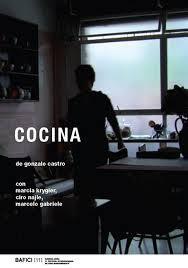Kitchen

As Gonzalo Castro himself says in the book Cine Argentino. Estéticas de la producción published by Bafici, the camera in his films is phonotropic: that is, it looks after the sound, more specifically the dialogue. Castro’s is a cinema that enthrones dialogue; a cinema that decides that to film is to film dialogue, and acts accordingly. Thus, there will be some cut where, according to cinematic orthodoxy, there shouldn’t be one: it’s all about obtaining the best dialogue. Because some of the dialogue is a one-time-only experience. Castro’s cinema could consist on that: on creating the conditions to develop the best dialogue, the most credible, with most hypnotic power. One wants to go on seeing Cocina because one wants to keep hearing that lady chef, also an architect, and the people she talks with chat about architecture and cooking, about what both things lead to, about bread and vegetables. This text has been, so far, pure hyperbole, and perhaps that’s unfair: because Castro (the orchestra man) also knows how to create atmospheres and beautifully cinematic images to support the dialogue, the addictive dialogue.